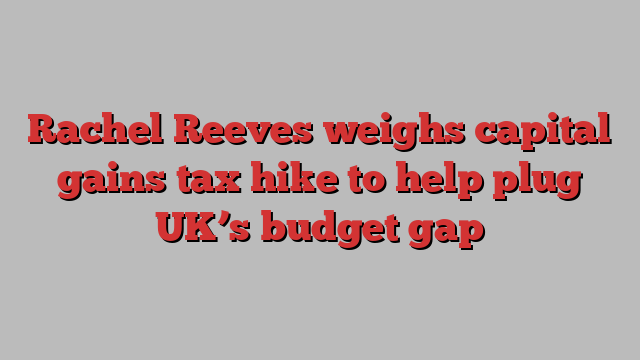
Unlock the Editor’s Digest for free
Roula Khalaf, Editor of the FT, selects her favourite stories in this weekly newsletter.
Rachel Reeves is considering an increase in capital gains tax as part of a multibillion-pound effort to fill a “black hole” in the public finances in her Budget later this month, according to government insiders.
The chancellor has been examining Treasury modelling on the impact of a range of changes to the capital gains tax regime, as part of an effort by the new government to ensure individuals with the “broadest shoulders” bear the burden of efforts to raise revenue.
Capital gains tax, or CGT, is charged on increase in the value of assets such as second homes and shares and raises around £15bn a year.
Reforming CGT is highly complex given it is levied at a range of rates across different asset classes, and also because of wealthy individuals’ ability to shift assets to income or change jurisdiction to mitigate the impact. The Institute for Fiscal Studies previously suggested that levying CGT at the same levels as income tax could raise high single-digit billions in revenue.
Officials have suggested the Treasury will need to raise upwards of £20bn a year from a range of tax measures as it attempts to tackle the legacy of an overspend in 2024-25 and address resulting spending pressures in future years. Reeves also needs to find ways to keep her promise not to return to “austerity” by mitigating real-terms cuts to departmental spending over the course of the decade.
The Treasury has begun notifying its key Budget measures to the Office for Budget Responsibility, the fiscal watchdog, after receiving an updated set of economic and fiscal forecasts this week.
While the Budget package to be presented on October 30 has yet to be settled, Reeves has been looking for ways of ensuring wealthy taxpayers are part of the solution — even as Labour seeks to woo global investors ahead of a closely watched investment summit on Monday.
As part of her efforts to raise taxes on the wealthiest, Reeves is also expected to consider changes to inheritance tax.
The Treasury is not, however, considering the introduction of a so-called exit tax on investors who decide to leave the country to avoid the impact of big gains on asset values, insiders said.
Earlier on Thursday, the Guardian reported Reeves had examined increases in CGT to as high as 39 per cent. A Treasury spokesperson said the figure “is not based on government modelling — we do not recognise it. This is pure speculation.”
Previous Conservative chancellors repeatedly tested whether capital gains tax rates should be moved closer to income tax rates.
However, people who served in the Treasury under Tory chancellors said their modelling showed that big rises in CGT could lead to a loss of revenue, due to the relatively small number of people who paid the tax.
“The issue is whether you actually raise money given 350,000 people is such a small number and they can change behaviour,” said one senior Treasury official, in a reference to the narrow CGT tax base.
One Tory Treasury veteran said: “We were constantly trying to find the optimum rate to incentivise investment because that would increase tax revenues. Modelling took place all the time.”
Jeremy Hunt, former chancellor, raised £300mn a year — although only in the short term — by reducing capital gains tax rates on property sales from 28 per cent to 24 per cent, thus bringing forward transactions.
However the Treasury will need to raise far more than is likely to be yielded from any CGT changes if it is to tackle the wider budgetary pressures it now faces.
The IFS said this week that the government would need to raise £25bn in tax if it wants to boost spending increases to a rate that is line with the growth of the overall economy — far higher than current plans.
This week Sir Keir Starmer, the prime minister, opened the door to a multibillion-pound increase in employer national insurance contributions as the government scrabbles for new sources of revenue.
Labour is, however, hamstrung by manifesto pledges to protect working people by not raising income tax, national insurance or VAT.
Senior Conservatives suspect slightly higher growth forecasts from the OBR could help Reeves shelve some tax rises.